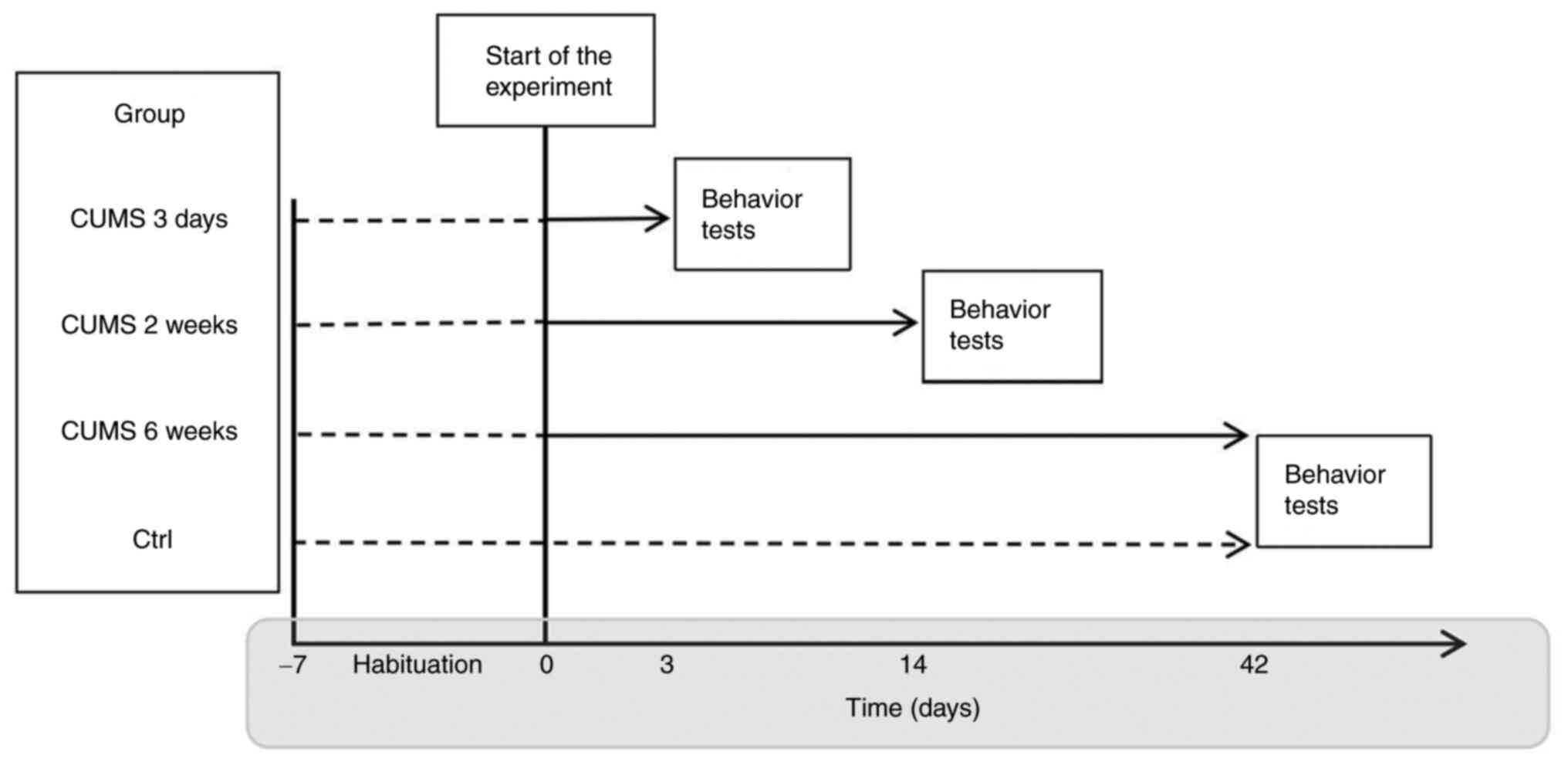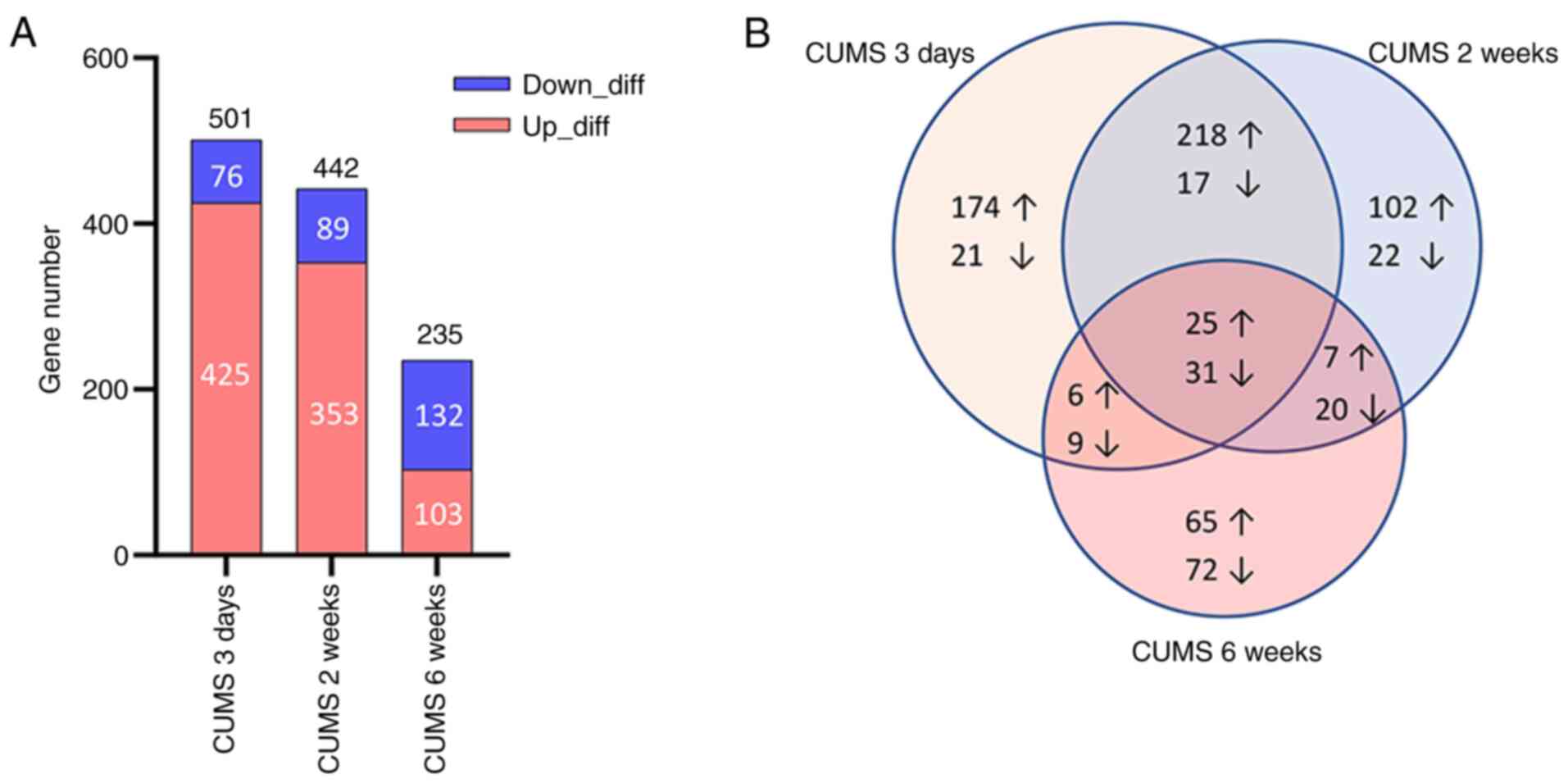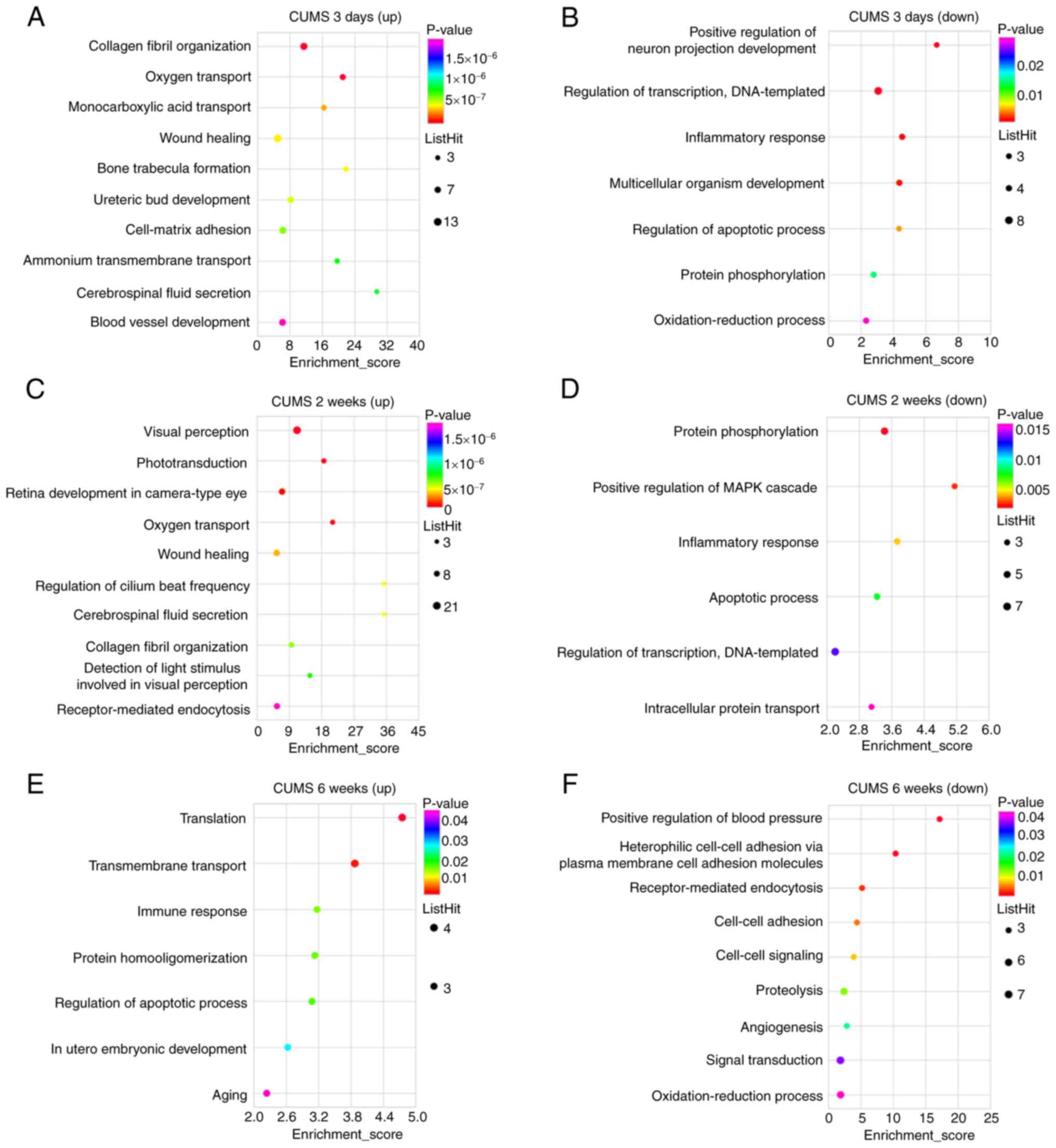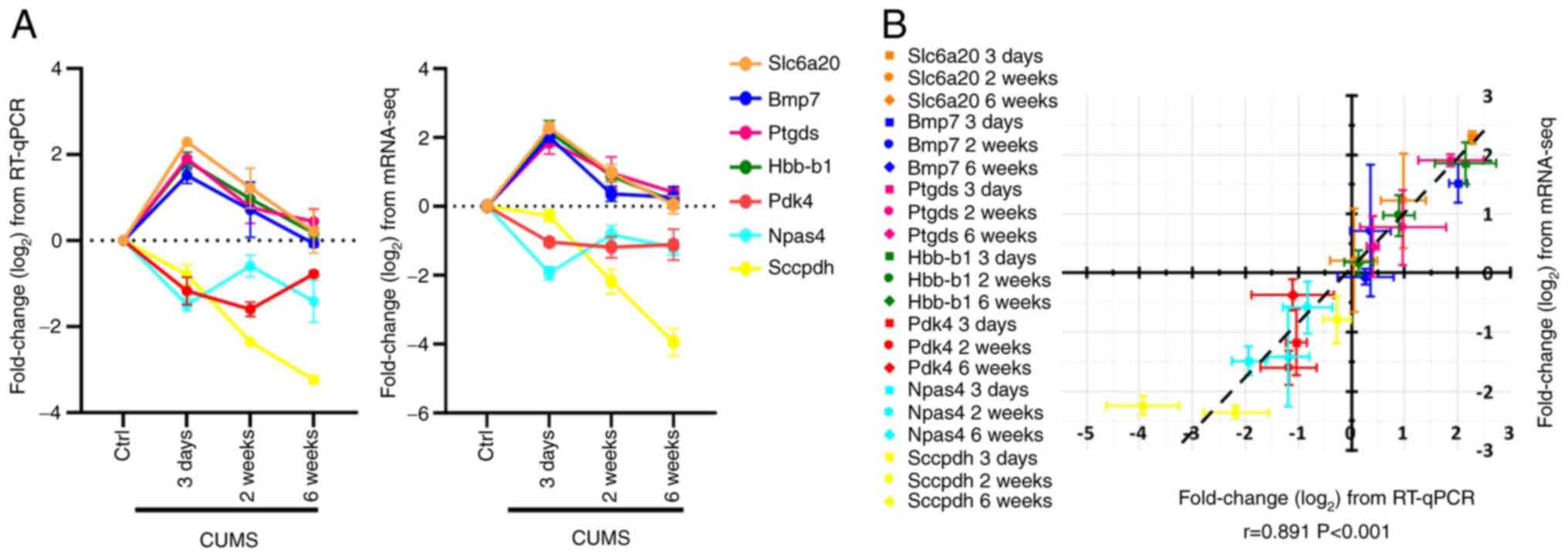|
1
|
McEwen BS, Bowles NP, Gray JD, Hill MN,
Hunter RG, Karatsoreos IN and Nasca C: Mechanisms of stress in the
brain. Nat Neurosci. 18:1353–1363. 2015. View Article : Google Scholar : PubMed/NCBI
|
|
2
|
Weinberg A and Creed F: Stress and
psychiatric disorder in healthcare professionals and hospital
staff. Lancet. 355:533–537. 2000. View Article : Google Scholar : PubMed/NCBI
|
|
3
|
Sinha R: Chronic stress, drug use, and
vulnerability to addiction. Ann NY Acad Sci. 1141:105–130. 2008.
View Article : Google Scholar : PubMed/NCBI
|
|
4
|
Rozanski A, Blumenthal JA and Kaplan J:
Impact of psychological factors on the pathogenesis of
cardiovascular disease and implications for therapy. Circulation.
99:2192–2217. 1999. View Article : Google Scholar : PubMed/NCBI
|
|
5
|
Bhatia V and Tandon RK: Stress and the
gastrointestinal tract. J Gastroenterol Hepatol. 20:332–339. 2005.
View Article : Google Scholar : PubMed/NCBI
|
|
6
|
Reiche EM, Nunes SO and Morimoto HK:
Stress, depression, the immune system, and cancer. Lancet Oncol.
5:617–625. 2004. View Article : Google Scholar : PubMed/NCBI
|
|
7
|
Sapolsky RM: Stress and the brain:
Individual variability and the inverted-U. Nat Neurosci.
18:1344–1346. 2015. View
Article : Google Scholar : PubMed/NCBI
|
|
8
|
Kim JJ and Diamond DM: The stressed
hippocampus, synaptic plasticity and lost memories. Nat Rev
Neurosci. 3:453–462. 2002. View
Article : Google Scholar : PubMed/NCBI
|
|
9
|
Kempermann G and Kronenberg G: Depressed
new neurons-adult hippocampal neurogenesis and a cellular
plasticity hypothesis of major depression. Biol Psychiatry.
54:499–503. 2003. View Article : Google Scholar : PubMed/NCBI
|
|
10
|
Chao HM, Ma LY, McEwen BS and Sakai RR:
Regulation of glucocorticoid receptor and mineralocorticoid
receptor messenger ribonucleic acids by selective agonists in the
rat hippocampus. Endocrinology. 139:1810–1814. 1998. View Article : Google Scholar : PubMed/NCBI
|
|
11
|
Li XH, Chen JX, Yue GX, Liu YY, Zhao X,
Guo XL, Liu Q, Jiang YM and Bai MH: Gene expression profile of the
hippocampus of rats subjected to chronic immobilization stress.
PLoS One. 8:e576212013. View Article : Google Scholar : PubMed/NCBI
|
|
12
|
Ubaldi M, Ricciardelli E, Pasqualini L,
Sannino G, Soverchia L, Ruggeri B, Falcinelli S, Renzi A, Ludka C,
Ciccocioppo R and Hardiman G: Biomarkers of hippocampal gene
expression in a mouse restraint chronic stress model.
Pharmacogenomics. 16:471–482. 2015. View
Article : Google Scholar : PubMed/NCBI
|
|
13
|
Antoniuk S, Bijata M, Ponimaskin E and
Wlodarczyk J: Chronic unpredictable mild stress for modeling
depression in rodents: Meta-analysis of model reliability. Neurosci
Biobehav Rev. 99:101–116. 2019. View Article : Google Scholar : PubMed/NCBI
|
|
14
|
Xie F, Zhao Y, Ma J, Gong JB, Wang SD,
Zhang L, Gao XJ and Qian LJ: The involvement of homocysteine in
stress-induced Aβ precursor protein misprocessing and related
cognitive decline in rats. Cell Stress Chaperones. 21:915–926.
2016. View Article : Google Scholar : PubMed/NCBI
|
|
15
|
Bolger AM, Lohse M and Usadel B:
Trimmomatic: A flexible trimmer for Illumina sequence data.
Bioinformatics. 30:2114–2120. 2014. View Article : Google Scholar : PubMed/NCBI
|
|
16
|
Kim D, Langmead B and Salzberg SL: HISAT:
A fast spliced aligner with low memory requirements. Nat Methods.
12:357–360. 2015. View Article : Google Scholar : PubMed/NCBI
|
|
17
|
Trapnell C, Williams BA, Pertea G,
Mortazavi A, Kwan G, van Baren MJ, Salzberg SL, Wold BJ and Pachter
L: Transcript assembly and quantification by RNA-Seq reveals
unannotated transcripts and isoform switching during cell
differentiation. Nat Biotechnol. 28:511–515. 2010. View Article : Google Scholar : PubMed/NCBI
|
|
18
|
Anders S, Pyl PT and Huber W: HTSeq-a
Python framework to work with high-throughput sequencing data.
Bioinformatics. 31:166–169. 2015. View Article : Google Scholar : PubMed/NCBI
|
|
19
|
Anders S and Huber W: Differential
expression analysis for sequence count data. Genome Biol.
11:R1062010. View Article : Google Scholar : PubMed/NCBI
|
|
20
|
Ashburner M, Ball CA, Blake JA, Botstein
D, Butler H, Cherry JM, Davis AP, Dolinski K, Dwight SS, Eppig JT,
et al: Gene ontology: Tool for the unification of biology. The gene
ontology consortium. Nat Genet. 25:25–29. 2000. View Article : Google Scholar : PubMed/NCBI
|
|
21
|
Pfaffl MW: A new mathematical model for
relative quantification in real-time RT-PCR. Nucleic Acids Res.
29:e452001. View Article : Google Scholar : PubMed/NCBI
|
|
22
|
Du J, Wang Y, Hunter R, Wei Y, Blumenthal
R, Falke C, Khairova R, Zhou R, Yuan P, Machado-Vieira R, et al:
Dynamic regulation of mitochondrial function by glucocorticoids.
Proc Natl Acad Sci USA. 106:3543–3548. 2009. View Article : Google Scholar : PubMed/NCBI
|
|
23
|
Daskalakis NP, Cohen H, Cai G, Buxbaum JD
and Yehuda R: Expression profiling associates blood and brain
glucocorticoid receptor signaling with trauma-related individual
differences in both sexes. Proc Natl Acad Sci USA. 111:13529–13534.
2014. View Article : Google Scholar : PubMed/NCBI
|
|
24
|
Govindarajan A, Rao BS, Nair D, Trinh M,
Mawjee N, Tonegawa S and Chattarji S: Transgenic brain-derived
neurotrophic factor expression causes both anxiogenic and
antidepressant effects. Proc Natl Acad Sci USA. 103:13208–13213.
2006. View Article : Google Scholar : PubMed/NCBI
|
|
25
|
Lakshminarasimhan H and Chattarji S:
Stress leads to contrasting effects on the levels of brain derived
neurotrophic factor in the hippocampus and amygdala. PLoS One.
7:e304812012. View Article : Google Scholar : PubMed/NCBI
|
|
26
|
Joëls M and Baram TZ: The neuro-symphony
of stress. Nat Rev Neurosci. 10:459–466. 2009. View Article : Google Scholar : PubMed/NCBI
|
|
27
|
Pu Z, Krugers HJ and Joëls M:
Corticosterone time-dependently modulates beta-adrenergic effects
on long-term potentiation in the hippocampal dentate gyrus. Learn
Mem. 14:359–367. 2007. View Article : Google Scholar : PubMed/NCBI
|
|
28
|
Clark WC, Yang JC and Janal MN: Altered
pain and visual sensitivity in humans: The effects of acute and
chronic stress. Ann NY Acad Sci. 467:116–129. 1986. View Article : Google Scholar : PubMed/NCBI
|
|
29
|
Tijerina L, Garrott WR, Stoltzfus D and
Parmer E: Eye glance behavior of van and passenger car drivers
during lane change decision phase. Transp Res Rec. 1937:37–43.
2005. View Article : Google Scholar
|
|
30
|
Paul M, Lech RK, Scheil J, Dierolf AM,
Suchan B and Wolf OT: Acute stress influences the discrimination of
complex scenes and complex faces in young healthy men.
Psychoneuroendocrinology. 66:125–129. 2016. View Article : Google Scholar : PubMed/NCBI
|
|
31
|
Smith KE, Leitzke BT and Pollak SD:
Youths' processing of emotion information: Responses to chronic and
video-based laboratory stress. Psychoneuroendocrinology.
122:1048732020. View Article : Google Scholar : PubMed/NCBI
|
|
32
|
Norton DJ, McBain RK, Pizzagalli DA,
Cronin-Golomb A and Chen Y: Dysregulation of visual motion
inhibition in major depression. Psychiatry Res. 240:214–221. 2016.
View Article : Google Scholar : PubMed/NCBI
|
|
33
|
Golomb JD, McDavitt JR, Ruf BM, Chen JI,
Saricicek A, Maloney KH, Hu J, Chun MM and Bhagwagar Z: Enhanced
visual motion perception in major depressive disorder. J Neurosci.
29:9072–9077. 2009. View Article : Google Scholar : PubMed/NCBI
|
|
34
|
Friberg TR and Borrero G: Diminished
perception of ambient light: A symptom of clinical depression? J
Affect Disord. 61:113–118. 2000. View Article : Google Scholar : PubMed/NCBI
|
|
35
|
Anwar MM, Özkan E and Gürsoy-Özdemir Y:
The role of extracellular matrix alterations in mediating astrocyte
damage and pericyte dysfunction in Alzheimer's disease: A
comprehensive review. Eur J Neurosci. Jun 28–2021.(Epub ahead of
print). View Article : Google Scholar : PubMed/NCBI
|
|
36
|
Rosenberg GA: Extracellular matrix
inflammation in vascular cognitive impairment and dementia. Clin
Sci (Lond). 131:425–437. 2017. View Article : Google Scholar : PubMed/NCBI
|
|
37
|
Hornberger LK, Singhroy S, Cavalle-Garrido
T, Tsang W, Keeley F and Rabinovitch M: Synthesis of extracellular
matrix and adhesion through beta(1) integrins are critical for
fetal ventricular myocyte proliferation. Circ Res. 87:508–515.
2000. View Article : Google Scholar : PubMed/NCBI
|
|
38
|
Henriet P, Zhong ZD, Brooks PC, Weinberg
KI and DeClerck YA: Contact with fibrillar collagen inhibits
melanoma cell proliferation by up-regulating p27KIP1. Proc Natl
Acad Sci USA. 97:10026–10031. 2000. View Article : Google Scholar : PubMed/NCBI
|
|
39
|
Kelly KK, MacPherson AM, Grewal H, Strnad
F, Jones JW, Yu J, Pierzchalski K, Kane MA, Herson PS and
Siegenthaler JA: Col1a1+ perivascular cells in the brain
are a source of retinoic acid following stroke. BMC Neurosci.
17:492016. View Article : Google Scholar : PubMed/NCBI
|
|
40
|
Falconer MA, Serafetinides EA and
Corsellis JA: Etiology and pathogenesis of temporal lobe epilepsy.
Arch Neurol. 10:233–248. 1964. View Article : Google Scholar : PubMed/NCBI
|
|
41
|
Thom M: Review: Hippocampal sclerosis in
epilepsy: A neuropathology review. Neuropathol Appl Neurobiol.
40:520–543. 2014. View Article : Google Scholar : PubMed/NCBI
|
|
42
|
Rosensteel SM, Wilson RP, White SL and
Ehrlich HP: COL1A1 oligodeoxynucleotides decoy: Biochemical and
morphologic effects in an acute wound repair model. Exp Mol Pathol.
89:307–313. 2010. View Article : Google Scholar : PubMed/NCBI
|
|
43
|
Shi-Wen X, Leask A and Abraham D:
Regulation and function of connective tissue growth factor/CCN2 in
tissue repair, scarring and fibrosis. Cytokine Growth Factor Rev.
19:133–144. 2008. View Article : Google Scholar : PubMed/NCBI
|
|
44
|
Krishnaswamy VR, Benbenishty A, Blinder P
and Sagi I: Demystifying the extracellular matrix and its
proteolytic remodeling in the brain: Structural and functional
insights. Cell Mol Life Sci. 76:3229–3248. 2019. View Article : Google Scholar : PubMed/NCBI
|
|
45
|
Moreno-Fernandez RD, Tabbai S,
Castilla-Ortega E, Perez-Martin M, Estivill-Torrus G, Rodriguez de
Fonseca F, Santin LJ and Pedraza C: Stress, depression, resilience
and ageing: A role for the LPA-LPA1 pathway. Curr Neuropharmacol.
16:271–283. 2018. View Article : Google Scholar : PubMed/NCBI
|
|
46
|
de Magalhães JP and Passos JF: Stress,
cell senescence and organismal ageing. Mech Ageing Dev. 170:2–9.
2018. View Article : Google Scholar : PubMed/NCBI
|
|
47
|
Segar TM, Kasckow JW, Welge JA and Herman
JP: Heterogeneity of neuroendocrine stress responses in aging rat
strains. Physiol Behav. 96:6–11. 2009. View Article : Google Scholar : PubMed/NCBI
|
|
48
|
Sapolsky RM, Krey LC and McEwen BS: The
neuroendocrinology of stress and aging: The glucocorticoid cascade
hypothesis. Endocr Rev. 7:284–301. 1986. View Article : Google Scholar : PubMed/NCBI
|
|
49
|
Raber J: Detrimental effects of chronic
hypothalamic-pituitary-adrenal axis activation. From obesity to
memory deficits. Mol Neurobiol. 18:1–22. 1998. View Article : Google Scholar : PubMed/NCBI
|
|
50
|
Elgh E, Lindqvist Astot A, Fagerlund M,
Eriksson S, Olsson T and Näsman B: Cognitive dysfunction,
hippocampal atrophy and glucocorticoid feedback in Alzheimer's
disease. Biol Psychiatry. 59:155–161. 2006. View Article : Google Scholar : PubMed/NCBI
|
|
51
|
Buwembo A, Long H and Walker CD:
Participation of endocannabinoids in rapid suppression of stress
responses by glucocorticoids in neonates. Neuroscience.
249:154–161. 2013. View Article : Google Scholar : PubMed/NCBI
|
|
52
|
Conrad CD: Chronic stress-induced
hippocampal vulnerability: The glucocorticoid vulnerability
hypothesis. Rev Neurosci. 19:395–411. 2008. View Article : Google Scholar : PubMed/NCBI
|
|
53
|
Bloss EB, Janssen WG, McEwen BS and
Morrison JH: Interactive effects of stress and aging on structural
plasticity in the prefrontal cortex. J Neurosci. 30:6726–6731.
2010. View Article : Google Scholar : PubMed/NCBI
|
|
54
|
Magariños AM, McEwen BS, Flügge G and
Fuchs E: Chronic psychosocial stress causes apical dendritic
atrophy of hippocampal CA3 pyramidal neurons in subordinate tree
shrews. J Neurosci. 16:3534–3540. 1996. View Article : Google Scholar : PubMed/NCBI
|
|
55
|
Magariños AM, Verdugo JM and McEwen BS:
Chronic stress alters synaptic terminal structure in hippocampus.
Proc Natl Acad Sci USA. 94:14002–14008. 1997. View Article : Google Scholar : PubMed/NCBI
|
|
56
|
Gould E and Tanapat P: Stress and
hippocampal neurogenesis. Biol Psychiatry. 46:1472–1479. 1999.
View Article : Google Scholar : PubMed/NCBI
|
|
57
|
McEwen BS: Stress and hippocampal
plasticity. Annu Rev Neurosci. 22:105–122. 1999. View Article : Google Scholar : PubMed/NCBI
|
|
58
|
Parul Mishra A, Singh S, Singh S, Tiwari
V, Chaturvedi S, Wahajuddin M, Palit G and Shukla S: Chronic
unpredictable stress negatively regulates hippocampal neurogenesis
and promote anxious depression-like behavior via upregulating
apoptosis and inflammatory signals in adult rats. Brain Res Bull.
172:164–179. 2021. View Article : Google Scholar : PubMed/NCBI
|
|
59
|
Dagyte G, Van der Zee EA, Postema F,
Luiten PG, Den Boer JA, Trentani A and Meerlo P: Chronic but not
acute foot-shock stress leads to temporary suppression of cell
proliferation in rat hippocampus. Neuroscience. 162:904–913. 2009.
View Article : Google Scholar : PubMed/NCBI
|
|
60
|
McEwen BS and Morrison JH: The brain on
stress: Vulnerability and plasticity of the prefrontal cortex over
the life course. Neuron. 79:16–29. 2013. View Article : Google Scholar : PubMed/NCBI
|


















